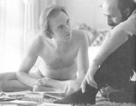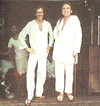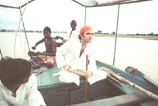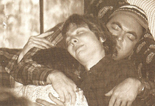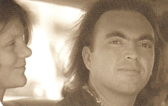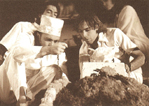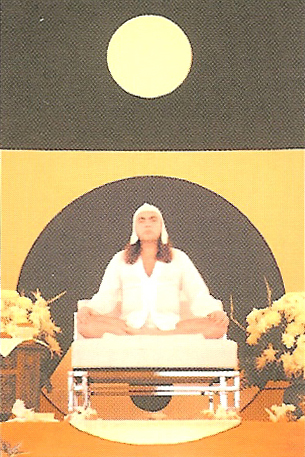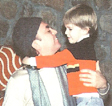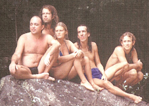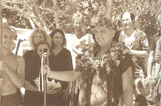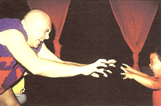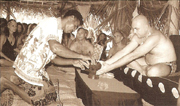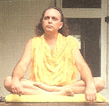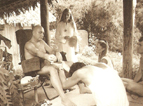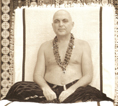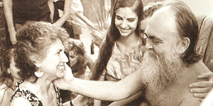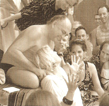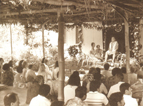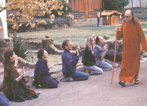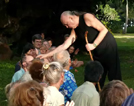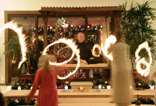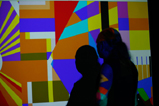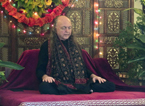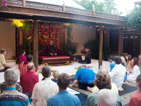Adi Da Up Close
Audio/Video Library
4,374,369 viewings/listens here since our AUDIO/VIDEO LIBRARY opened on Jan. 27, 2009.
(For more, see our graph.)
Our multimedia library currently contains 1,010 YouTube video clips and audio clips about (or related to) Adi Da and Adidam.
An excerpt from Track 2 ("Understand Your Un-Happiness") of the CD, The Location of Happiness, a Discourse given by Avatar Adi Da on November 28, 1981.
In this Discourse, Avatar Adi Da describes the Nature of True Happiness and how it can be Realized moment to moment — not through seeking but through whole bodily Communion with the One Who Is Happiness. Formerly titled "The Bodily Location of Happiness", this updated edition of the CD is remastered and expanded, with 13 additional minutes of content.
Tags: CD

In this Discourse, Avatar Adi Da describes the Nature of True Happiness and how it can be Realized moment to moment — not through seeking but through whole bodily Communion with the One Who Is Happiness. Formerly titled "The Bodily Location of Happiness", this updated edition of the CD is remastered and expanded, with 13 additional minutes of content.
Tags: CD
An excerpt from the CD, The Dual Sensitivity That Moves The Heart: Two Discourses Given by His Divine Presence Avatar Adi Da Samraj, June 20 and 21, 1995.
In these exquisite Discourses, which were recorded over two consecutive nights on the island of Naitauba in Fiji, Avatar Adi Da Communicated essential Instruction on what He calls the "dual sensitivity" — or, the simultaneous sensitivity to the suffering of mortal existence and to the heart's impulse toward True Happiness.
ADI DA: It is not sufficient just to always remember that this is not paradise, that this is mortality-land, everything passes. . . . You must realize that your heart-disposition . . . cannot be satisfied with anything less than Infinite, Absolute Happiness, or Divine Realization. And on the basis of that dual sensitivity, I Call you to respond to Me.
Tags: CD

In these exquisite Discourses, which were recorded over two consecutive nights on the island of Naitauba in Fiji, Avatar Adi Da Communicated essential Instruction on what He calls the "dual sensitivity" — or, the simultaneous sensitivity to the suffering of mortal existence and to the heart's impulse toward True Happiness.
ADI DA: It is not sufficient just to always remember that this is not paradise, that this is mortality-land, everything passes. . . . You must realize that your heart-disposition . . . cannot be satisfied with anything less than Infinite, Absolute Happiness, or Divine Realization. And on the basis of that dual sensitivity, I Call you to respond to Me.
Tags: CD
This audio excerpt is from the CD, The Ultimate Self-Understanding and Divine Communion, a collection of Talk excerpts illustrating the two fundamental principles of Avatar Adi Da’s Unique Revelation.
Tags: CD

Tags: CD
CHRIS TONG: Happy Danavira Mela to everyone!
I’ve sung Have Yourself a Merry Little Christmas to Beloved Adi Da many times over the years — at the Manner of Flowers, at Adi Da Samrajashram, at First People / Great Food Dish, etc. (as one of a small group of singers, and usually also as the keyboardist) — and I’m singing it to Him again (and all of you!) here. It is one of my favorite songs at this time of year.
For me (starting with Judy Garland's original film version), it has always been an emotion-filled song, by turns joyful, playful, nostalgic, and wistful — so that is how I sing it here. The karaoke arrangement is based on Michael Bublé's version.
Tags: Danavira Mela

I’ve sung Have Yourself a Merry Little Christmas to Beloved Adi Da many times over the years — at the Manner of Flowers, at Adi Da Samrajashram, at First People / Great Food Dish, etc. (as one of a small group of singers, and usually also as the keyboardist) — and I’m singing it to Him again (and all of you!) here. It is one of my favorite songs at this time of year.
For me (starting with Judy Garland's original film version), it has always been an emotion-filled song, by turns joyful, playful, nostalgic, and wistful — so that is how I sing it here. The karaoke arrangement is based on Michael Bublé's version.
Tags: Danavira Mela
[Contains Spanish subtitles. If the CC icon ("Subtitles/closed captions") has a red line under it, the subtitles should appear. If you don't see them, just press the CC icon to turn them on.]
This is a video excerpt from Adi Da's classic talk, "The Bodily Location of Happiness", which He gave on November 28, 1981. This talk was originally published in the book, The Bodily Location Of Happiness. The full talk is available on DVD and on CD, and as an online transcript.
ADI DA: Life is foolishness. This is no time, in any case, to be tolerant of foolishness. The world is mad, and these are dreadful times. Things are not going to be easier in the years ahead. The spiritual process has always been lived in difficult times. Therefore, the spiritual process tolerates no fool. The spiritual process itself will spit you out. It is not an easy attainment, but a profoundly difficult affair. Even what you have listened to today has been heard by only a fraction of the human race in all of history. The opportunity to practice is extremely rare, and the fulfillment of practice is practically unknown.
In some sense you could say this life is hell. . . The nature of this hell is that we are self-possessed. We are born in un-Happiness and we do not transcend it readily. We constantly pursue Happiness through all kinds of incredibly complex means, and we never attain It. . .
If Spiritual Realizers did not turn about and Teach, this would truly be a hell instead of being like a hell. It would truly be a hell if there were no possibility of Enlightenment, if there were no Teaching, no Spiritual Masters, no sacred Way, no sacred community, no capacity for understanding or self-transcendence.
Tags: Spanish CD DVD

This is a video excerpt from Adi Da's classic talk, "The Bodily Location of Happiness", which He gave on November 28, 1981. This talk was originally published in the book, The Bodily Location Of Happiness. The full talk is available on DVD and on CD, and as an online transcript.
ADI DA: Life is foolishness. This is no time, in any case, to be tolerant of foolishness. The world is mad, and these are dreadful times. Things are not going to be easier in the years ahead. The spiritual process has always been lived in difficult times. Therefore, the spiritual process tolerates no fool. The spiritual process itself will spit you out. It is not an easy attainment, but a profoundly difficult affair. Even what you have listened to today has been heard by only a fraction of the human race in all of history. The opportunity to practice is extremely rare, and the fulfillment of practice is practically unknown.
In some sense you could say this life is hell. . . The nature of this hell is that we are self-possessed. We are born in un-Happiness and we do not transcend it readily. We constantly pursue Happiness through all kinds of incredibly complex means, and we never attain It. . .
If Spiritual Realizers did not turn about and Teach, this would truly be a hell instead of being like a hell. It would truly be a hell if there were no possibility of Enlightenment, if there were no Teaching, no Spiritual Masters, no sacred Way, no sacred community, no capacity for understanding or self-transcendence.
Tags: Spanish CD DVD
Contains Spanish subtitles. If the CC icon ("Subtitles/closed captions") has a red line under it, the subtitles should appear. If you don't see them, just press the CC icon to turn them on.]
Un discurso clásico dado por Avatar Adi Da en 1981 sobre la naturaleza de la Verdadera Felicidad y cómo puede ser Realizada momento a momento, pero no a través de su búsqueda.
This is a video excerpt from Adi Da's classic talk, "The Bodily Location of Happiness", which He gave on November 28, 1981. This talk was originally published in the book, The Bodily Location Of Happiness. The full talk is available on DVD and on CD, and as an online transcript.
Tags: CD DVD Spanish

Un discurso clásico dado por Avatar Adi Da en 1981 sobre la naturaleza de la Verdadera Felicidad y cómo puede ser Realizada momento a momento, pero no a través de su búsqueda.
This is a video excerpt from Adi Da's classic talk, "The Bodily Location of Happiness", which He gave on November 28, 1981. This talk was originally published in the book, The Bodily Location Of Happiness. The full talk is available on DVD and on CD, and as an online transcript.
Tags: CD DVD Spanish
words: Avatar Adi Da Samraj
music: Chris Tong
sung by: the Adidam New England Choir
(with all devotees joining in)
choir members:
Chris Tong, Paul Caswell, Patricia Rydle, Lisa Alexandra Fry
pianist / choir director: Chris Tong
date: Danavira Mela, 1993
CHRIS: I just ran across an old audio tape with this recording. The quality is not the best, and the choir is not professional, but there is so much heart-feeling in devotees’ singing, and our Beloved Heart-Master’s Words are so beautiful and heart-moving, that I felt compelled to share this for Danavira Mela.
Tags: music

music: Chris Tong
sung by: the Adidam New England Choir
(with all devotees joining in)
choir members:
Chris Tong, Paul Caswell, Patricia Rydle, Lisa Alexandra Fry
pianist / choir director: Chris Tong
date: Danavira Mela, 1993
CHRIS: I just ran across an old audio tape with this recording. The quality is not the best, and the choir is not professional, but there is so much heart-feeling in devotees’ singing, and our Beloved Heart-Master’s Words are so beautiful and heart-moving, that I felt compelled to share this for Danavira Mela.
Tags: music
[Contains Italian subtitles. If the CC icon ("Subtitles/closed captions") has a red line under it, the subtitles should appear. If you don't see them, just press the CC icon to turn them on.]
This is a video excerpt from Adi Da's classic talk, "The Bodily Location of Happiness", which He gave on November 28, 1981. This talk was originally published in the book, The Bodily Location Of Happiness. The full talk is available on CD and on a new DVD, The Location Of Happiness.
Tags: CD DVD Italian

This is a video excerpt from Adi Da's classic talk, "The Bodily Location of Happiness", which He gave on November 28, 1981. This talk was originally published in the book, The Bodily Location Of Happiness. The full talk is available on CD and on a new DVD, The Location Of Happiness.
Tags: CD DVD Italian
[Contains Finnish subtitles. If the CC icon ("Subtitles/closed captions") has a red line under it, the subtitles should appear. If you don't see them, just press the CC icon to turn them on.]
Tämä on ote Adi Dan puheesta "Ilon ruumiillinen sijainti", jonka Hän antoi 28. marraskuuta 1981.
This is a video excerpt from Adi Da's classic talk, "The Bodily Location of Happiness", which He gave on November 28, 1981. This talk was originally published in the book, The Bodily Location Of Happiness. The full talk is available on DVD and on CD, and as an online transcript.
ADI DA: Elämä on typeryyttä. Nyt ei ole muutenkaan aika suvaita typeryyttä. Maailma on hullu, ja nämä ovat karmeita aikoja. Asiat eivät helpotu tulevina vuosina. Hengellistä prosessia on aina eletty vaikeina aikoina. Hengellinen prosessi ei siis suvaitse typerystä. Hengellinen prosessi sylkäisee sinut ulos. Se ei ole helppo saavutus, vaan syvästi vaikea koettamus. Jopa se, mitä tänään kuulitte on vain ihmiskunnan murto-osan kuulemaa kautta historian. Mahdollisuus harjoittaa hengellistä prosessia on erittäin harvinainen, ja sen täyttymys on\Nkäytännössä tuntematon.
Jossain mielessä voisi sanoa, että tämä on elämä on helvettiä. Uskonnollisella kielellämme puhumme siitä, mitä voi tapahtua kuoleman jälkeen. Voit joko nousta taivaaseen tai joutua puhdistautumaan kiirastuleen, tai voit joutua helvettiin. Ja sitten ehkä joudut kiirastuleen tai tilapäiseen helvettiin, mutta ehkä sinulla on riittävästi hyvää onnea syntyä ihmiseksi, jotta voit omistautua hengelliselle prosessille. Tämän helvetin luonne on, että olemme itseemme käpertyneitä. Synnymme ilottomuudessa emmekä helposti pääse tämän ilottomuuden yli. Tavoittelemme iloa jatkuvasti kaikenlaisin uskomattoman monimutkaisin keinoin emmekä ikinä saavuta sitä.
Jos Hengelliset Mestarit eivät olisi alkaneet opettamaan, tämä todellakin olisi helvetti eikä vain helvetin kaltainen. Tämä todellakin olisi helvetti jos täällä ei olisi Valaistuksen mahdollisuutta, jos täällä ei olisi Opetusta, ei Hengellisiä Mestareita, ei Pyhää Tietä, ei Pyhää yhteisöä, ei kykyä ymmärtää tai ylittää itseään.
ADI DA: Life is foolishness. This is no time, in any case, to be tolerant of foolishness. The world is mad, and these are dreadful times. Things are not going to be easier in the years ahead. The spiritual process has always been lived in difficult times. Therefore, the spiritual process tolerates no fool. The spiritual process itself will spit you out. It is not an easy attainment, but a profoundly difficult affair. Even what you have listened to today has been heard by only a fraction of the human race in all of history. The opportunity to practice is extremely rare, and the fulfillment of practice is practically unknown.
In some sense you could say this life is hell. . . The nature of this hell is that we are self-possessed. We are born in un-Happiness and we do not transcend it readily. We constantly pursue Happiness through all kinds of incredibly complex means, and we never attain It. . .
If Spiritual Realizers did not turn about and Teach, this would truly be a hell instead of being like a hell. It would truly be a hell if there were no possibility of Enlightenment, if there were no Teaching, no Spiritual Masters, no sacred Way, no sacred community, no capacity for understanding or self-transcendence.
Tags: Finnish CD DVD

Tämä on ote Adi Dan puheesta "Ilon ruumiillinen sijainti", jonka Hän antoi 28. marraskuuta 1981.
This is a video excerpt from Adi Da's classic talk, "The Bodily Location of Happiness", which He gave on November 28, 1981. This talk was originally published in the book, The Bodily Location Of Happiness. The full talk is available on DVD and on CD, and as an online transcript.
ADI DA: Elämä on typeryyttä. Nyt ei ole muutenkaan aika suvaita typeryyttä. Maailma on hullu, ja nämä ovat karmeita aikoja. Asiat eivät helpotu tulevina vuosina. Hengellistä prosessia on aina eletty vaikeina aikoina. Hengellinen prosessi ei siis suvaitse typerystä. Hengellinen prosessi sylkäisee sinut ulos. Se ei ole helppo saavutus, vaan syvästi vaikea koettamus. Jopa se, mitä tänään kuulitte on vain ihmiskunnan murto-osan kuulemaa kautta historian. Mahdollisuus harjoittaa hengellistä prosessia on erittäin harvinainen, ja sen täyttymys on\Nkäytännössä tuntematon.
Jossain mielessä voisi sanoa, että tämä on elämä on helvettiä. Uskonnollisella kielellämme puhumme siitä, mitä voi tapahtua kuoleman jälkeen. Voit joko nousta taivaaseen tai joutua puhdistautumaan kiirastuleen, tai voit joutua helvettiin. Ja sitten ehkä joudut kiirastuleen tai tilapäiseen helvettiin, mutta ehkä sinulla on riittävästi hyvää onnea syntyä ihmiseksi, jotta voit omistautua hengelliselle prosessille. Tämän helvetin luonne on, että olemme itseemme käpertyneitä. Synnymme ilottomuudessa emmekä helposti pääse tämän ilottomuuden yli. Tavoittelemme iloa jatkuvasti kaikenlaisin uskomattoman monimutkaisin keinoin emmekä ikinä saavuta sitä.
Jos Hengelliset Mestarit eivät olisi alkaneet opettamaan, tämä todellakin olisi helvetti eikä vain helvetin kaltainen. Tämä todellakin olisi helvetti jos täällä ei olisi Valaistuksen mahdollisuutta, jos täällä ei olisi Opetusta, ei Hengellisiä Mestareita, ei Pyhää Tietä, ei Pyhää yhteisöä, ei kykyä ymmärtää tai ylittää itseään.
ADI DA: Life is foolishness. This is no time, in any case, to be tolerant of foolishness. The world is mad, and these are dreadful times. Things are not going to be easier in the years ahead. The spiritual process has always been lived in difficult times. Therefore, the spiritual process tolerates no fool. The spiritual process itself will spit you out. It is not an easy attainment, but a profoundly difficult affair. Even what you have listened to today has been heard by only a fraction of the human race in all of history. The opportunity to practice is extremely rare, and the fulfillment of practice is practically unknown.
In some sense you could say this life is hell. . . The nature of this hell is that we are self-possessed. We are born in un-Happiness and we do not transcend it readily. We constantly pursue Happiness through all kinds of incredibly complex means, and we never attain It. . .
If Spiritual Realizers did not turn about and Teach, this would truly be a hell instead of being like a hell. It would truly be a hell if there were no possibility of Enlightenment, if there were no Teaching, no Spiritual Masters, no sacred Way, no sacred community, no capacity for understanding or self-transcendence.
Tags: Finnish CD DVD
[Contains Spanish subtitles. If the CC icon ("Subtitles/closed captions") has a red line under it, the subtitles should appear. If you don't see them, just press the CC icon to turn them on.]
In this excerpt from an Avataric Discourse, Adi Da speaks about the necessity to become disillusined with mortal life in a positive sense. Positive disillusionment is emerging when one begins to understand and relinquish the stressful and ultimately futile search for personal survival, worldly happiness, and ultimate life fulfillment. Only then can one be drawn into recognizing, learning about, and ecstatically participating in Reality Itself, in relationship to a True Realizer.
ADI DA: The teaching of Truth is for those who are disillusioned in the positive sense, who have been sobered in their lives by grasping the nature of existence and being cured of search.
Tags: Avataric Discourse Spanish

In this excerpt from an Avataric Discourse, Adi Da speaks about the necessity to become disillusined with mortal life in a positive sense. Positive disillusionment is emerging when one begins to understand and relinquish the stressful and ultimately futile search for personal survival, worldly happiness, and ultimate life fulfillment. Only then can one be drawn into recognizing, learning about, and ecstatically participating in Reality Itself, in relationship to a True Realizer.
ADI DA: The teaching of Truth is for those who are disillusioned in the positive sense, who have been sobered in their lives by grasping the nature of existence and being cured of search.
Tags: Avataric Discourse Spanish
[Contains Italian subtitles. If the CC icon ("Subtitles/closed captions") has a red line under it, the subtitles should appear. If you don't see them, just press the CC icon to turn them on.]
This is a video excerpt from Adi Da's classic talk, "The Bodily Location of Happiness", which He gave on November 28, 1981. This talk was originally published in the book, The Bodily Location Of Happiness. The full talk is available on DVD and on CD, and as an online transcript.
ADI DA: Life is foolishness. This is no time, in any case, to be tolerant of foolishness. The world is mad, and these are dreadful times. Things are not going to be easier in the years ahead. The spiritual process has always been lived in difficult times. Therefore, the spiritual process tolerates no fool. The spiritual process itself will spit you out. It is not an easy attainment, but a profoundly difficult affair. Even what you have listened to today has been heard by only a fraction of the human race in all of history. The opportunity to practice is extremely rare, and the fulfillment of practice is practically unknown.
In some sense you could say this life is hell. . . The nature of this hell is that we are self-possessed. We are born in un-Happiness and we do not transcend it readily. We constantly pursue Happiness through all kinds of incredibly complex means, and we never attain It. . .
If Spiritual Realizers did not turn about and Teach, this would truly be a hell instead of being like a hell. It would truly be a hell if there were no possibility of Enlightenment, if there were no Teaching, no Spiritual Masters, no sacred Way, no sacred community, no capacity for understanding or self-transcendence.
Tags: CD DVD Italian

This is a video excerpt from Adi Da's classic talk, "The Bodily Location of Happiness", which He gave on November 28, 1981. This talk was originally published in the book, The Bodily Location Of Happiness. The full talk is available on DVD and on CD, and as an online transcript.
ADI DA: Life is foolishness. This is no time, in any case, to be tolerant of foolishness. The world is mad, and these are dreadful times. Things are not going to be easier in the years ahead. The spiritual process has always been lived in difficult times. Therefore, the spiritual process tolerates no fool. The spiritual process itself will spit you out. It is not an easy attainment, but a profoundly difficult affair. Even what you have listened to today has been heard by only a fraction of the human race in all of history. The opportunity to practice is extremely rare, and the fulfillment of practice is practically unknown.
In some sense you could say this life is hell. . . The nature of this hell is that we are self-possessed. We are born in un-Happiness and we do not transcend it readily. We constantly pursue Happiness through all kinds of incredibly complex means, and we never attain It. . .
If Spiritual Realizers did not turn about and Teach, this would truly be a hell instead of being like a hell. It would truly be a hell if there were no possibility of Enlightenment, if there were no Teaching, no Spiritual Masters, no sacred Way, no sacred community, no capacity for understanding or self-transcendence.
Tags: CD DVD Italian
[Contains Finnish subtitles. If the CC icon ("Subtitles/closed captions") has a red line under it, the subtitles should appear. If you don't see them, just press the CC icon to turn them on.]
Gerald Sheinfeld, joka on omistautunut Avatar Adi Dalle 1970-luvun alusta saakka, kertoo tarinan Gurunsa löytämisestä, ja siitä, miten hän välittömästi tunnisti Avatar Adi Dan ainutlaatuisen olotilan, joka viestii vapautta, iloa ja vapautusta. Gerald selittää, miten tuon kaltainen tunnistus Adi Dan olotilasta herkistää yksilön Aiemman Ykseyden asemaan.
Gerald Sheinfeld, a devotee of Avatar Adi Da since the early 1970's, tells a wonderful story about how he found his Guru, Adi Da Samraj and his immediate recognition of Adi Da's unique state of Freedom, Happiness, and Liberation. Gerald speaks about how that recognition of Adi Da has the capacity to awaken others to that state of Prior Unity.
Tags: Finnish

Gerald Sheinfeld, joka on omistautunut Avatar Adi Dalle 1970-luvun alusta saakka, kertoo tarinan Gurunsa löytämisestä, ja siitä, miten hän välittömästi tunnisti Avatar Adi Dan ainutlaatuisen olotilan, joka viestii vapautta, iloa ja vapautusta. Gerald selittää, miten tuon kaltainen tunnistus Adi Dan olotilasta herkistää yksilön Aiemman Ykseyden asemaan.
Gerald Sheinfeld, a devotee of Avatar Adi Da since the early 1970's, tells a wonderful story about how he found his Guru, Adi Da Samraj and his immediate recognition of Adi Da's unique state of Freedom, Happiness, and Liberation. Gerald speaks about how that recognition of Adi Da has the capacity to awaken others to that state of Prior Unity.
Tags: Finnish
[Contains Finnish subtitles. If the CC icon ("Subtitles/closed captions") has a red line under it, the subtitles should appear. If you don't see them, just press the CC icon to turn them on.]
Avatar Adi Dan antama puhe vuodelta 1981, joka käsittelee Aidon Ilon luonnetta ja sen Toteutusta hetkestä hetkeen, joka ei onnistu sitä etsimällä.
This is a video excerpt from Adi Da's classic talk, "The Bodily Location of Happiness", which He gave on November 28, 1981. This talk was originally published in the book, The Bodily Location Of Happiness. The full talk is available on CD and on a new DVD, The Location Of Happiness.
Tags: CD DVD Finnish

Avatar Adi Dan antama puhe vuodelta 1981, joka käsittelee Aidon Ilon luonnetta ja sen Toteutusta hetkestä hetkeen, joka ei onnistu sitä etsimällä.
This is a video excerpt from Adi Da's classic talk, "The Bodily Location of Happiness", which He gave on November 28, 1981. This talk was originally published in the book, The Bodily Location Of Happiness. The full talk is available on CD and on a new DVD, The Location Of Happiness.
Tags: CD DVD Finnish
[Contains Polish subtitles. If the CC icon ("Subtitles/closed captions") has a red line under it, the subtitles should appear. If you don't see them, just press the CC icon to turn them on.]
Oto fragment rozmowy Adi Da, "Gdzie w ciele jest szczęście?", którą wygłosił 28 listopada 1981 roku. Poniżej publikujemy fragment tekstu z tego nagrania.
"Duchowy Proces w trudnych czasach" ("The Spiritual Process in Troubled Times") is a video excerpt from Adi Da's classic talk, "The Bodily Location of Happiness", which He gave on November 28, 1981. This talk was originally published in the book, The Bodily Location Of Happiness. The full talk is available on DVD and on CD, and as an online transcript.
ADI DA: Życie jest głupotą, ale to nie są czasy na tolerowanie głupoty. Świat jest szalony, to straszne czasy, a w nadchodzących latach wcale nie będzie łatwiej. Proces duchowy zawsze przeżywano w trudnych czasach. Dlatego proces duchowy nie toleruje głupca. Sam Proces Duchowy pokona cię. Nie jest to łatwe osiągnięcie, to nieprawdopodobnie trudna sprawa. Nawet to, czego dzisiaj słuchaliście, zostało wysłuchane tylko przez ułamek rodzaju ludzkiego w całej jego historii. Możliwość praktyki jest niezwykle rzadka, a spełnienie jej jest praktycznie nieznane.
W pewnym sensie można powiedzieć, że to życie jest piekłem. W naszym języku religijnym mówimy o tym, co może się z tobą stać po śmierci. Cóż, można iść do nieba, można iść do czyśćca żeby się oczyścić lub można iść do piekła. A potem być może udasz się do czyśćca czy tymczasowego piekła, i może będziesz miał szczęście urodzić się jako istota ludzka i poświęcić się duchowemu procesowi. Natura tego piekła polega na tym, że jesteśmy opętani sami sobą. Rodzimy się w nie-Szczęściu i nie przekraczamy go łatwo. Nieustannie dążymy do szczęścia poprzez wszelkiego rodzaju niezwykle złożone środki i nigdy go nie osiągamy.
Gdyby Urzeczywistnieni Adepci nie wracali by nauczać, to tutaj byłoby naprawdę piekło, a nie coś podobnego do piekła. Gdyby nie było możliwości Oświecenia, gdyby nie był Nauk, nie było Boskiego Prawa, Adeptów, Świętej Drogi, Świętej wspólnoty, ani możliwości samo-transcendencji, to tutaj byłoby naprawdę piekło.
ADI DA: Life is foolishness. This is no time, in any case, to be tolerant of foolishness. The world is mad, and these are dreadful times. Things are not going to be easier in the years ahead. The spiritual process has always been lived in difficult times. Therefore, the spiritual process tolerates no fool. The spiritual process itself will spit you out. It is not an easy attainment, but a profoundly difficult affair. Even what you have listened to today has been heard by only a fraction of the human race in all of history. The opportunity to practice is extremely rare, and the fulfillment of practice is practically unknown.
In some sense you could say this life is hell. . . The nature of this hell is that we are self-possessed. We are born in un-Happiness and we do not transcend it readily. We constantly pursue Happiness through all kinds of incredibly complex means, and we never attain It. . .
If Spiritual Realizers did not turn about and Teach, this would truly be a hell instead of being like a hell. It would truly be a hell if there were no possibility of Enlightenment, if there were no Teaching, no Spiritual Masters, no sacred Way, no sacred community, no capacity for understanding or self-transcendence.
Tags: Polish DVD CD

Oto fragment rozmowy Adi Da, "Gdzie w ciele jest szczęście?", którą wygłosił 28 listopada 1981 roku. Poniżej publikujemy fragment tekstu z tego nagrania.
"Duchowy Proces w trudnych czasach" ("The Spiritual Process in Troubled Times") is a video excerpt from Adi Da's classic talk, "The Bodily Location of Happiness", which He gave on November 28, 1981. This talk was originally published in the book, The Bodily Location Of Happiness. The full talk is available on DVD and on CD, and as an online transcript.
ADI DA: Życie jest głupotą, ale to nie są czasy na tolerowanie głupoty. Świat jest szalony, to straszne czasy, a w nadchodzących latach wcale nie będzie łatwiej. Proces duchowy zawsze przeżywano w trudnych czasach. Dlatego proces duchowy nie toleruje głupca. Sam Proces Duchowy pokona cię. Nie jest to łatwe osiągnięcie, to nieprawdopodobnie trudna sprawa. Nawet to, czego dzisiaj słuchaliście, zostało wysłuchane tylko przez ułamek rodzaju ludzkiego w całej jego historii. Możliwość praktyki jest niezwykle rzadka, a spełnienie jej jest praktycznie nieznane.
W pewnym sensie można powiedzieć, że to życie jest piekłem. W naszym języku religijnym mówimy o tym, co może się z tobą stać po śmierci. Cóż, można iść do nieba, można iść do czyśćca żeby się oczyścić lub można iść do piekła. A potem być może udasz się do czyśćca czy tymczasowego piekła, i może będziesz miał szczęście urodzić się jako istota ludzka i poświęcić się duchowemu procesowi. Natura tego piekła polega na tym, że jesteśmy opętani sami sobą. Rodzimy się w nie-Szczęściu i nie przekraczamy go łatwo. Nieustannie dążymy do szczęścia poprzez wszelkiego rodzaju niezwykle złożone środki i nigdy go nie osiągamy.
Gdyby Urzeczywistnieni Adepci nie wracali by nauczać, to tutaj byłoby naprawdę piekło, a nie coś podobnego do piekła. Gdyby nie było możliwości Oświecenia, gdyby nie był Nauk, nie było Boskiego Prawa, Adeptów, Świętej Drogi, Świętej wspólnoty, ani możliwości samo-transcendencji, to tutaj byłoby naprawdę piekło.
ADI DA: Life is foolishness. This is no time, in any case, to be tolerant of foolishness. The world is mad, and these are dreadful times. Things are not going to be easier in the years ahead. The spiritual process has always been lived in difficult times. Therefore, the spiritual process tolerates no fool. The spiritual process itself will spit you out. It is not an easy attainment, but a profoundly difficult affair. Even what you have listened to today has been heard by only a fraction of the human race in all of history. The opportunity to practice is extremely rare, and the fulfillment of practice is practically unknown.
In some sense you could say this life is hell. . . The nature of this hell is that we are self-possessed. We are born in un-Happiness and we do not transcend it readily. We constantly pursue Happiness through all kinds of incredibly complex means, and we never attain It. . .
If Spiritual Realizers did not turn about and Teach, this would truly be a hell instead of being like a hell. It would truly be a hell if there were no possibility of Enlightenment, if there were no Teaching, no Spiritual Masters, no sacred Way, no sacred community, no capacity for understanding or self-transcendence.
Tags: Polish DVD CD
[Contains Finnish subtitles. If the CC icon ("Subtitles/closed captions") has a red line under it, the subtitles should appear. If you don't see them, just press the CC icon to turn them on.]
Sanat kuten "vapaus" ja "rakkaus" määritetään yleisesssä maallikkoympäristössä erittäin rajoitetusti. Tässä Adi Dan esseen lausunnassa hän avaa näiden sanojen aitoa merkitystä.
Slides from a Darshan occasion of Avatar Adi Da at Adi Da Samrajashram.
The audio recording is an excerpt from a recitation of Adi Da's essay, "Freedom Is The Only Law and Happiness Is The Only Reality". This is the Epilogue from Adi Da's book, The Truly Human New World-Culture of Unbroken Real-God-Man, which was originally written in 2001, and updated on November 13, 2019. The essay is read by a student of Adi Da. In the secular world, words like "freedom" and " love" are given a very limited definition. In this essay, Adi Da expands the true meaning of both of these words.
ADI DA: I Am here to Divinely Liberate all beings.
I Am here to Grant True Freedom to every one.
“Freedom” is one of the principal words associated with the politics of this “late-time”. The general trend toward the democratization of the entire world carries with it an intensified interest in the concept of freedom and in the pursuit of freedom. However, in the context and circumstance of this “late-time”, the word “freedom” is used in such a way that the true import of the word is lost, and its meaning is transformed, and even vulgarized.
The same process of vulgarization has also occurred in the case of other words, such as (for example) the word “love”. The word “love” represents a profound concept and reality, but the word itself tends to be used very casually. People commonly say that they “love” this or that, meaning something quite different from what the word “love” rightly and truly signifies.
“Love” is a word that rightly refers to the universal Sacrifice of ego-“self”. Real love is a matter of transcending “self” (or going beyond your limitations in relation to others)—but, in the “late-time” circumstance of vulgarized culture, the word “love” has come to be used in relation to whatever satisfies your inclinations, or fulfills your desires, or (otherwise) somehow compensates for limitations in your life by pleasing you and (thereby) supporting your egoic disposition. None of that has anything to do with real love.
So it also is with the word “freedom”, and the notion of freedom. The world-culture of this “late-time” is essentially an ego-culture associated with complications in the first three stages of life. It is essentially an adolescent culture. And it is in the context of that culture that great words like “love” and “freedom” become vulgarized. In the adolescent disposition, the word “freedom”, like the word “love”, is reduced to an egoic meaning. People say they want to be “free”, or want to act “freely”, or want to be “free” to do this or that—but what they actually mean is that they want to be able to fulfill their desires without limitation. An adolescent reacting to parental authority or parental expectations regards any such authority or expectations to be oppressive or limiting. Therefore, such adolescents say that they want to be “free” to do whatever they please. And that is, in general, what is meant in this “late-time” by the word “freedom”. Even in the larger political sphere, the word “freedom” is used to express the (personal, and also collective) intent to be able to fulfill desires—and those desires are (necessarily) fundamentally ego-based.
What does the fulfillment of desires have to do with true freedom? Rightly, the word “freedom” is synonymous with the word “liberation”. To “be free”, or to “be liberated”, means to “go beyond bondage”. The opposite of “freedom” is “bondage”. If one is truly moved to be truly free, one is moved to relinquish (and go beyond) bondage. Such is the true Wisdom-understanding of freedom.
Neither true freedom, nor real love, nor any other great concept is rightly understood via the words and concepts of adolescents. There must be human maturity (and, therefore, growth in Wisdom) for the great meanings underlying these concepts to be understood and actually lived.
Be moved toward real love, without limit. Be moved toward real happiness, without limit.
Be moved toward true freedom, without limit. You should (and, ultimately, must) be so moved. But to actually realize love (or real happiness, or true freedom) without limit, you must deal with yourself most profoundly. You cannot merely be reactive, like an adolescent or a worldly person.
If you want to be truly free, you must first understand that you are bound, and you must understand how you are bound, and then you must do something about that. If, on the other hand, you are merely reactively inclined to fulfill desires, and you want to be (so-called) “free” to do so, then you are not examining your bondage—what its roots are, what its signs are, what its characteristics are—and, if you are not examining your bondage with real discriminative intelligence, you are also not doing what you must do in order to be truly free.
Tags: Finnish

Sanat kuten "vapaus" ja "rakkaus" määritetään yleisesssä maallikkoympäristössä erittäin rajoitetusti. Tässä Adi Dan esseen lausunnassa hän avaa näiden sanojen aitoa merkitystä.
Slides from a Darshan occasion of Avatar Adi Da at Adi Da Samrajashram.
The audio recording is an excerpt from a recitation of Adi Da's essay, "Freedom Is The Only Law and Happiness Is The Only Reality". This is the Epilogue from Adi Da's book, The Truly Human New World-Culture of Unbroken Real-God-Man, which was originally written in 2001, and updated on November 13, 2019. The essay is read by a student of Adi Da. In the secular world, words like "freedom" and " love" are given a very limited definition. In this essay, Adi Da expands the true meaning of both of these words.
ADI DA: I Am here to Divinely Liberate all beings.
I Am here to Grant True Freedom to every one.
“Freedom” is one of the principal words associated with the politics of this “late-time”. The general trend toward the democratization of the entire world carries with it an intensified interest in the concept of freedom and in the pursuit of freedom. However, in the context and circumstance of this “late-time”, the word “freedom” is used in such a way that the true import of the word is lost, and its meaning is transformed, and even vulgarized.
The same process of vulgarization has also occurred in the case of other words, such as (for example) the word “love”. The word “love” represents a profound concept and reality, but the word itself tends to be used very casually. People commonly say that they “love” this or that, meaning something quite different from what the word “love” rightly and truly signifies.
“Love” is a word that rightly refers to the universal Sacrifice of ego-“self”. Real love is a matter of transcending “self” (or going beyond your limitations in relation to others)—but, in the “late-time” circumstance of vulgarized culture, the word “love” has come to be used in relation to whatever satisfies your inclinations, or fulfills your desires, or (otherwise) somehow compensates for limitations in your life by pleasing you and (thereby) supporting your egoic disposition. None of that has anything to do with real love.
So it also is with the word “freedom”, and the notion of freedom. The world-culture of this “late-time” is essentially an ego-culture associated with complications in the first three stages of life. It is essentially an adolescent culture. And it is in the context of that culture that great words like “love” and “freedom” become vulgarized. In the adolescent disposition, the word “freedom”, like the word “love”, is reduced to an egoic meaning. People say they want to be “free”, or want to act “freely”, or want to be “free” to do this or that—but what they actually mean is that they want to be able to fulfill their desires without limitation. An adolescent reacting to parental authority or parental expectations regards any such authority or expectations to be oppressive or limiting. Therefore, such adolescents say that they want to be “free” to do whatever they please. And that is, in general, what is meant in this “late-time” by the word “freedom”. Even in the larger political sphere, the word “freedom” is used to express the (personal, and also collective) intent to be able to fulfill desires—and those desires are (necessarily) fundamentally ego-based.
What does the fulfillment of desires have to do with true freedom? Rightly, the word “freedom” is synonymous with the word “liberation”. To “be free”, or to “be liberated”, means to “go beyond bondage”. The opposite of “freedom” is “bondage”. If one is truly moved to be truly free, one is moved to relinquish (and go beyond) bondage. Such is the true Wisdom-understanding of freedom.
Neither true freedom, nor real love, nor any other great concept is rightly understood via the words and concepts of adolescents. There must be human maturity (and, therefore, growth in Wisdom) for the great meanings underlying these concepts to be understood and actually lived.
Be moved toward real love, without limit. Be moved toward real happiness, without limit.
Be moved toward true freedom, without limit. You should (and, ultimately, must) be so moved. But to actually realize love (or real happiness, or true freedom) without limit, you must deal with yourself most profoundly. You cannot merely be reactive, like an adolescent or a worldly person.
If you want to be truly free, you must first understand that you are bound, and you must understand how you are bound, and then you must do something about that. If, on the other hand, you are merely reactively inclined to fulfill desires, and you want to be (so-called) “free” to do so, then you are not examining your bondage—what its roots are, what its signs are, what its characteristics are—and, if you are not examining your bondage with real discriminative intelligence, you are also not doing what you must do in order to be truly free.
Tags: Finnish





